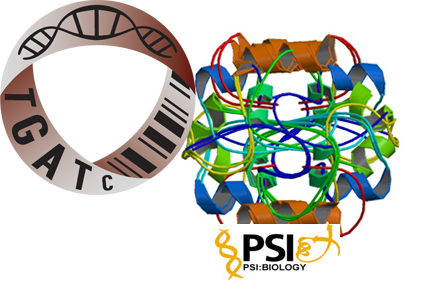Tribute to PSI:Biology-MR

With the completion of the sequencing of the genomes of human and other organisms, attention was redirected to focus on the characterization and function of proteins, the products of genes. The availability of sequence data and the growing impact of structural biology on biomedical research have prompted scientific groups worldwide to undertake projects in the emerging field of structural genomics.
The objective of the Protein Structure Initiative (PSI) was to solve protein structures and to make these structures widely available for clinical and basic studies with the expectation that this expands the knowledge of the role of proteins both in normal biological processes and in disease. The long-range goal of the PSI was to make the three-dimensional atomic-level structures of most proteins easily predictable from their corresponding DNA sequences.
The PSI comprised a consortium of institutions, each of which focused on a unique set of targets or protein type (e.g. eukaryotic or membrane proteins). Each PSI Center created thousands of plasmid clones containing genes or fragments of genes to be used for protein expression, purification, crystallization and structure determination.
Additional annotations were assembled through the PSI Structural Biology Knowledgebase and other resources to facilitate cross referencing of the plasmid to relevant experimental and structural data. Combined, this created a valuable resource that can be used by non-PSI researchers to determine the biological functions of these genes, many of which are hypothetical genes or genes of unknown function.
For more information about the PSI:Biology-MR see our paper in the Journal of Structural and Functional Genomics.
Remembering the PSI Structural Biology Knowledgebase

Created as a collaboration with the Nature Publishing Group, the PSI Structural Biology Knowledgebase (SBKB) was a web resource designed to turn the products of the structural genomics and structural biology efforts into knowledge that can be used by the biological community to understand living systems and disease. It contained information on all the three-dimensional protein structures solved, homology models, features about particular proteins and the latest methods for cloning, expression, purification and structural determination of proteins.
Technology Portal
 The Technology Portal of the Protein Structure Initiative Structural Biology Knowledgebase was a web resource designed to provide methods and tools that can be employed to relieve bottlenecks in many areas of structural genomics and structural biology research. Several useful features were available on the web site, including multiple ways to search the database of over 400 technological advances, links to online resources, and access to videos of methods on YouTube. In addition, users were able to participate in a technology forum where they connected, asked questions, received news, and developed collaborations with fellow scientists.
The Technology Portal of the Protein Structure Initiative Structural Biology Knowledgebase was a web resource designed to provide methods and tools that can be employed to relieve bottlenecks in many areas of structural genomics and structural biology research. Several useful features were available on the web site, including multiple ways to search the database of over 400 technological advances, links to online resources, and access to videos of methods on YouTube. In addition, users were able to participate in a technology forum where they connected, asked questions, received news, and developed collaborations with fellow scientists.
Historical PSI:Biology Network
DNASU LinkedIn page
DNASU Twitter feed @DNASUPlasmids
| Consortium Name | Institution |
|---|---|
| CSMP | University of California - San Francisco |
| CSMP | CSMP Biological Partner - University of Kansas |
| GPCR Network | The Scripps Research Institute |
| GPCR Network | GPCR Network Biological Partner - University of California San Diego |
| JCSG | The Scripps Research Institute |
| JCSG | Biological Partner - University of California San Francisco |
| JCSG | Biological Partner - The Scripps Research Institute |
| MCSG | Argonne National Laboratory |
| MCSG | Biological Partner - Pacific Northwest National Laboratory |
| MCSG | Biological Partner -Texas A&M University |
| MPID | Arizona State University |
| MPSBC | University of Rochester |
| MPSbyNMR | Harvard University |
| NESG | Rutgers University |
| NESG | NESG Biological Partner - University of Chicago |
| NESG | NESG Biological Partner - University of Wisconsin |
| NYCOMPS | NYSBC |
| NYSGRC | Albert Einstein College of Medicine |
| NYSGRC | NYSGRC Biological Partner - Sanford Burnham |
| NYSGRC | NYSGRC Biological Partner -Stanford University |
| NYSGRC | NYSGRC Biological Partner - Rockefeller University |
| NYSGRC | NYSGRC Biological Partner - Albert Einstein College of Medicine |
| TEMIMPS | New York University |
| TMPC | University of Wisconsin |
| TransportPDB | The Scripps Research Institute |

